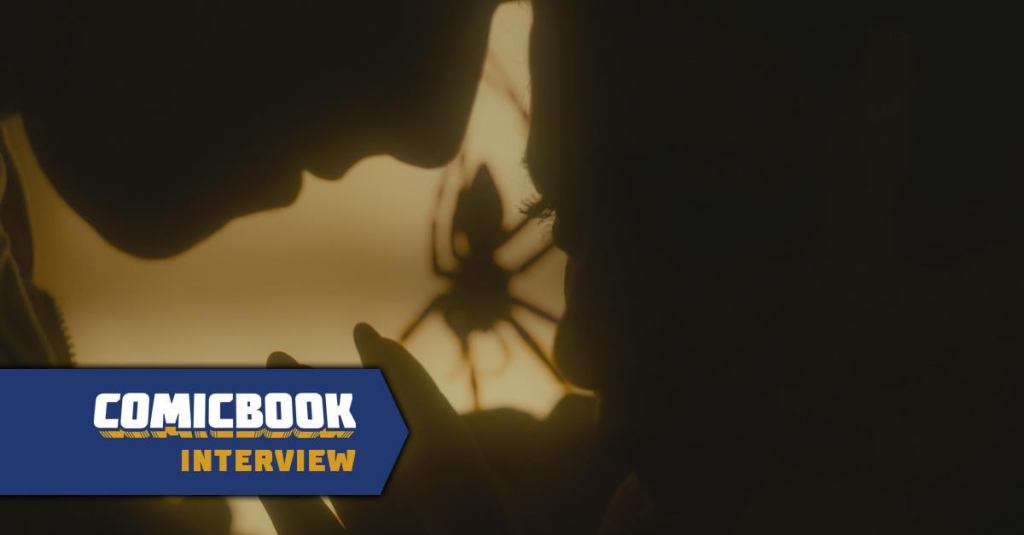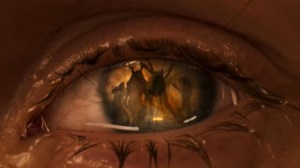In the early days of horror, filmmakers often looked to the animal kingdom as a source of inspiration, often exaggerating true-life details about creatures for the sake of a story. In recent years, likely in large part due to how much the scientific community has uncovered about the true nature of animals of all shapes and sizes, there has been less of an exploration of what happens when mother nature turns on humanity. With Infested, filmmaker Sébastien Vaniček has tapped into a primal fear of spiders, and while the mere sight of creepy crawlies can send a chill down a viewer’s spine, the French director claims his movie came from a place of love. Infested lands on Shudder on April 26th.
Videos by ComicBook.com
Infested is described, “Kaleb is about to turn 30 and has never been lonelier. He’s fighting with his sister over an inheritance and has cut ties with his best friend. Fascinated by exotic animals, he finds a venomous spider in a shop and brings it back to his apartment. It only takes a moment for the spider to escape and reproduce, turning the whole building into a dreadful web trap. The only option for Kaleb and his friends is to find a way out and survive.”
ComicBook.com caught up with Vaniček to talk developing the project, biggest challenges on set, and his plans for the upcoming Evil Dead spinoff.

ComicBook.com: I feel like there’s a primal fear or ickiness of bugs and spiders, but I wondered if you personally, what were the origins of this story, of this movie, and if you yourself particularly had a memorable run-in with bugs or spiders that really left an impact on you when you were growing up?
Sébastien Vaniček: No, I’m more of a lover of bugs and spiders and that’s why I film them so closely and I had this big shot of bugs and insects, but there is a really interesting question: why are we afraid of spiders? And that’s the question I ask myself a lot.
I think it started when I discovered Alien when I was young and I was like, “Okay, I’m amazed by this creature. I don’t know why I’m afraid of it but I have to understand.” I draw a lot so I started to draw this creature and this xenomorph to understand, and I think I have the same fascination with spiders because I want to understand why people are afraid of them.
I am not [afraid of them] but I want to understand, and I think it’s always about the shape and there is something about the shape that disturbs people, and the parallel between people who are judged because of what they look like or what they come from was perfect. You put suburbans and spiders in a building, you trap them and they will have to survive, and you start to understand that yeah, they look alike, they are judged by where they come from and what they look like, so it was really interesting to have this parallel and I think that’s how Infested was born.
As someone who is passionate about spiders and bugs and insects, what was the development of these specific spiders, at least in regards to how actual science comes into play? Because you have a few scenes where you’re looking over all these various specimens and talking about the reality of them. These spiders, I feel like, might be exaggerated from what you might normally find, so how did you find that balance?
Because spider movies have kind of a bad reputation, they are always B-movies, and spiders are big tarantulas and they scream like humans and it’s always funny, and I wanted to do something realistic with spiders and to be really, really frightening but using spiders that everybody knows; they are not so exotic. You know their shape here. Everybody has seen these kinds of spiders in their living room someday.
So the first thing was to have spiders that you know, so these spiders with big legs and not so much hair was the first step, and I have to be realistic, so with Florent [Bernard], my co-author, we took all the things that spiders have in nature, the fact that they get bigger when they have a lot of predators, to bear more eggs, to multiply themselves really fast, that mothers can sometimes bear their babies on their back, and we took everything and we put everything in a box and we’d said, “Okay, let’s use this, let’s use this.” We just did plus 20%, plus 30%, but it’s based on nature, we just exaggerated it in order to have an entertaining movie and a promising movie.
You mentioned how so many spider movies are B-movies with just big spiders and you run from them and they’re pretty one-dimensional, and I really appreciated how your movie blended together so many different themes; not just a horror movie but how it’s almost like an infection movie and how there’s talk about police forces and marginalized people. You blend together so many interesting themes. Was that something that was a goal from the beginning, that you had all these big concepts that you knew you wanted to blend together, or did it start as a straightforward thing and evolve into all these different layers?
Yeah, I was born in France so I knew French movies, but I grew up watching American movies from Steven Spielberg so there is a balance that’s happening inside me. The fact that we do something good in France, our writing is important, our author’s point of view is really important here, so I grew up with these stories and the fact that when you write something you have to tell something about humans, about politics, you need to have a social statement, but I wanted to have the best entertaining experience because I grew up watching Jurassic Park or E.T., so I wanted to blend these two intentions but I’m not inventing anything because we had, a few years back, Get Out from Jordan Peele and we all thought, “Wow, we can see a horror movie with such an intense political point of view.”
And after I started to watch back Alien movies and things like that, and I thought, “Yeah, all great movies have this social statement or something universal to say.” So I needed to say something about France, about suburbans, about suburbs in France, about people who are judged because they look like this or that, about xenophobia, and I needed to do it but in an entertaining way, so that’s why I always put the fun and the fear in first but I hid the statement under this layer of entertainment.
I think by having the whole building be pretty poorly lit, it helped really blur the line between what was a real spider, what was a practical effect, what was CGI, so what was the whole breakdown of real spider, practical effect, visual effect, and what were the challenges presented in actually bringing all of these arachnids to life?
The best answer is that I didn’t have enough money to do this movie, so I have a 50/50; 50% real spiders and 50% CGI, and even some of our CGI shots are based on real spiders so it’s just a real spider that I filmed and we made it bigger, and the challenge was to have … the perfect idea was for the CGI to blend in the movie in the best way because I didn’t have money because it was made in France, and because it’s the first French monster movie, I was waiting here in France. Everybody was like, “Okay, if your CGI sucks, man, you won’t do another movie.”
So I had some pressure and I had decided during the writing process that, yeah, maybe the spiders will move in the shadows, but as soon as there is light, they won’t move like this. When there is light, I can use practical effects or real spiders that don’t move, and when the light is off, I will be able to have good CGI, because in the dark it’s always easier to make the look realistic, but I think that’s one of the main things that we never talk about, to make something real and make you believe in the movie in creatures is the sound. I put 80% of my energy into sound with my sound team. We knew each other for 15 years, and I told them, “Guys, we need to have the best sounds for these spiders.” It’s a movie for ears, too, and I think that I put a lot of energy into sound in order for the spiders to be real.
You spoke about Spielberg earlier in the early ’90s you had a movie like Tremors, which was super huge, fun, successful film, you had a movie like Arachnophobia, huge, fun, successful Amblin film, but they’ve almost completely gone away, then movies had to be something more supernatural or found footage or whatever. I wondered what your thoughts are on why monster movies have gone away almost as a complete genre.
I don’t know. Maybe we found that the most horrible monster we have are humans, and since 9/11 we understood that there’s nothing more horrible than this so maybe monsters are not so frightening anymore, but I think we are getting back to monsters because it’s such an entertaining way to show shadows that we have as humans. It’s such a cool way to watch our reflection in the mirror, and I would go further saying that I’m really interested in animals when they’re monsters because our relationship with animals can tell a lot about us. That’s why in my movies and my short movies and with Infested, too, I want to show a side of human, showing their relationship with animals.
I know it’s in super early stages and I know you can’t really talk about it, but looking to the future and how you’ve been tapped for a new Evil Dead, which is super exciting, I wondered, just in a broader sense, as you’re approaching developing and creating a story for a new spinoff, what about the franchise do you feel like you aim to specifically honor? What is it about the franchise that you’re so excited about that you can’t wait to honor, and how do you aim to set yourself apart from the original trilogy, the reboot, and Evil Dead Rise?
Everything is in the question that Sam Raimi and his team asked me. The first thing they asked me was, “What would be your Evil Dead?” And there was the word “your,” so that was like, that gives me some artistic freedom, and I think I understood what’s Evil Dead and I was like, “Okay, if this is Evil Dead, I will do this and that because I want to explore this and that.” And they liked my answer and that’s why they gave me this job.
But I love what Sam Raimi did. He was a 20-something-year-old guy with a camera and he wanted to do something crazy, so he did a lot of crazy shots and he wanted to shock the audience, and that’s something I really identify with because I was this guy. I did a lot of short movies with my team without any money or anything, so I’m kind of like this guy.
I also like the vision of Fede Álvarez, for example, in 2013 when he thought, “Okay, let’s do an Evil Dead movie, but let’s do it in a more realistic way because now the audience grew up and now we need to have something less, a bit, I would say silly, less funny,” and I’m thinking about doing something that would give justice to both of these visions. The vision, the real vision, something realistic that hurts you, a mean movie that moves you, and when you go up to the theater, you are like, “What the hell?”
And something that’s also crazy, this 20-year-old guy with some crazy camera shots, and also the statement that Sam Raimi had about friendship, about love, about family, it’s really important to me to stick with something that’s in the script, in the writing process. I need to have strong characters. I need to have a big statement. I need to have an intelligent movie or smart movie. And after, as soon as I have this, I will be able to do something crazy and with a lot of Deadites and things like that, and to have a strong movie, but I need to have a really strong basis and I think that the strong basis is in Sam Raimi’s work, so I’m trying to take the best of every part of even that.
I think it’s interesting how, as you’re talking about that, about how between Fede and Lee Cronin from the UK, and now a French perspective, how it’s really interesting how those international, diverse cinematic sensibilities are going to impact — whether it’s at the forefront or just subconsciously — impacting the entire movie, how your French background is going to impact what Evil Dead is.
Yeah, that’s why I think that Ghost House team is really smart. They are looking for visions and they trusted Fede Álvarez even though he only did a short movie, and they trusted Lee Cronin even though he did a small movie in Ireland, and they trust now a French guy who did a movie in France, but I think that they see a vision, they see a way of dealing with tension, of dealing with the editing, of dealing with the sound and image, and they think like, “Okay, this guy is another generation that will give a new path to Evil Dead.” And they are looking for this, I think, so that’s why they gave me freedom, and it’s so cool to work with them because they are so trustful and it’s really cool.
Infested lands on Shudder on April 26th.
This interview has been edited for length and clarity. You can contact Patrick Cavanaugh directly on Twitter.








